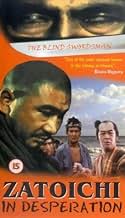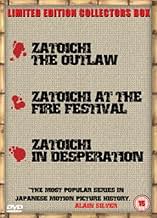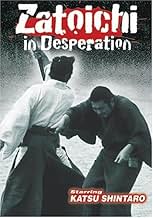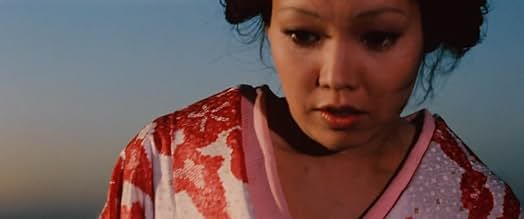AVALIAÇÃO DA IMDb
6,8/10
1,2 mil
SUA AVALIAÇÃO
Adicionar um enredo no seu idiomaAfter accidentally causing an old lady's death, Zatoichi seeks out her daughter to atone for the tragedy, consequently getting into all sorts of trouble.After accidentally causing an old lady's death, Zatoichi seeks out her daughter to atone for the tragedy, consequently getting into all sorts of trouble.After accidentally causing an old lady's death, Zatoichi seeks out her daughter to atone for the tragedy, consequently getting into all sorts of trouble.
- Direção
- Roteiristas
- Artistas
- Direção
- Roteiristas
- Elenco e equipe completos
- Produção, bilheteria e muito mais no IMDbPro
Avaliações em destaque
This is the best one, number 24. Ichi realizes that he is not a hero, is making everyone's lives ultimately more violent and difficult than it would have without his existence. He is physically punished for this and still dispatches 20 dudes without using his hands.
If you don't like mean people, you know, actually effective villains, this one might make your little sensitivities buzz. The moral philosophy Katsu evaluates is artful and considerate. This is a brutal, dark, and ballsy entry.
If you don't like mean people, you know, actually effective villains, this one might make your little sensitivities buzz. The moral philosophy Katsu evaluates is artful and considerate. This is a brutal, dark, and ballsy entry.
The following review is an extract from the book "Shintaro Katsu´s Zatoichi: Complete guide to all movies", which is now available on Amazon.
Zatoichi crosses a bridge with a woman who plays the shamisen. The old woman warns him to be careful, for the wood of the bridge has holes, and it is easy to fall if one does not pay attention. The two talk briefly, and the lady asks the blind man where he is going. "Nowhere in particular, wherever the wind takes me", replies the wandering masseur. The old woman replies that she intends to visit her daughter, who works in a geisha house called Ogiya in a nearby town. Moments after they have said goodbye, the blind man has the idea of offering some coins to the old woman, as a tip for playing the shamisen so well... The grateful woman is about to take the coins, but distracted by the surprising gift, slips, loses her balance and falls into the void... She, who had recommended to the blind man to be very careful.
Zatoichi feels guilty for the deadly accident of the poor woman. Unlike its owner, the instrument has remained on the bridge and the masseur picks it up. With the shamisen he walks towards the city of which the deceased spoke to him, to look for his daughter, the geisha, in Ogiya.
(...)
This, the 24th and penultimate, is one of the two films in the saga directed by actor Shintaro Katsu himself, who also acted as co-producer. The other, also directed by Katsu, is the last of the originals (called "Zatoichi" just like that), which was filmed many years later - in 1989 - and where you can see an already grayed and almost old Ichi.
"Zatoichi in desperation", as its title already indicates, is fraught with deep pessimism. Oppressive and dark, sad, depressing and hopeless. Tragically and emotionally brutal.
It also has an undeniable poetic undertone.
Zatoichi crosses a bridge with a woman who plays the shamisen. The old woman warns him to be careful, for the wood of the bridge has holes, and it is easy to fall if one does not pay attention. The two talk briefly, and the lady asks the blind man where he is going. "Nowhere in particular, wherever the wind takes me", replies the wandering masseur. The old woman replies that she intends to visit her daughter, who works in a geisha house called Ogiya in a nearby town. Moments after they have said goodbye, the blind man has the idea of offering some coins to the old woman, as a tip for playing the shamisen so well... The grateful woman is about to take the coins, but distracted by the surprising gift, slips, loses her balance and falls into the void... She, who had recommended to the blind man to be very careful.
Zatoichi feels guilty for the deadly accident of the poor woman. Unlike its owner, the instrument has remained on the bridge and the masseur picks it up. With the shamisen he walks towards the city of which the deceased spoke to him, to look for his daughter, the geisha, in Ogiya.
(...)
This, the 24th and penultimate, is one of the two films in the saga directed by actor Shintaro Katsu himself, who also acted as co-producer. The other, also directed by Katsu, is the last of the originals (called "Zatoichi" just like that), which was filmed many years later - in 1989 - and where you can see an already grayed and almost old Ichi.
"Zatoichi in desperation", as its title already indicates, is fraught with deep pessimism. Oppressive and dark, sad, depressing and hopeless. Tragically and emotionally brutal.
It also has an undeniable poetic undertone.
It started up well, yet, at a certain point the script turned to a level of imbecility comparable with a big studio US creation. Well, compared with the level of the US Academy this can easily can take an Oscar for best script.
On the other hand this movie achieves something almost unique. The visual style is so unusual (especially for somebody used with the standard blockbuster) that both makes the film unforgettable and hard to watch. In my opinion this is what Mean Streets and The Killing of a Chinese Bookie should have looked like if the tech team involved would have been skilled enough. The gambling scene alone makes Rounders look like a half baked high-school project (which is not far from the truth anyway).
A 6 for cramming so much into this movie. You have a social message, the indolence of the rich (the young watching the fishermen's boats burn), the unromaticised noblemen, etc.
Contact me with Questions, Comments or Suggestions ryitfork @ bitmail.ch
On the other hand this movie achieves something almost unique. The visual style is so unusual (especially for somebody used with the standard blockbuster) that both makes the film unforgettable and hard to watch. In my opinion this is what Mean Streets and The Killing of a Chinese Bookie should have looked like if the tech team involved would have been skilled enough. The gambling scene alone makes Rounders look like a half baked high-school project (which is not far from the truth anyway).
A 6 for cramming so much into this movie. You have a social message, the indolence of the rich (the young watching the fishermen's boats burn), the unromaticised noblemen, etc.
Contact me with Questions, Comments or Suggestions ryitfork @ bitmail.ch
I am new to the Zatoichi film series; this was the first film in the series I have seen, after buying a couple of seasons of the TV series and enjoying them. If the rest of the series is as good as this one then I can see I am in for a virtual lifetime of great Zatoichi films - when I can find them in video stores!
"Zatoichi in Desperation" is darker and as another reviewer said, more "heavy handed" than the TV episodes I have seen. The characters - the prostitute given a tentative freedom, the fishermen from the village harassed by the local yakuza gang, the 14-year-old girl about to be forced to work in the brothel and her little brother - are memorable and tragic. Their lives become intertwined with Zatoichi's by a twist of fate - an old woman who accidentally falls from a bridge, and Zatoichi's guilt resulting over it.
This intertwining of relationships, Zatoichi's humbleness despite his master swordsmanship, and the great photography is what makes the film (and the Zatoichi series!) special.
"Zatoichi in Desperation" is darker and as another reviewer said, more "heavy handed" than the TV episodes I have seen. The characters - the prostitute given a tentative freedom, the fishermen from the village harassed by the local yakuza gang, the 14-year-old girl about to be forced to work in the brothel and her little brother - are memorable and tragic. Their lives become intertwined with Zatoichi's by a twist of fate - an old woman who accidentally falls from a bridge, and Zatoichi's guilt resulting over it.
This intertwining of relationships, Zatoichi's humbleness despite his master swordsmanship, and the great photography is what makes the film (and the Zatoichi series!) special.
I've seen 23 of the 26 films in the series (not including the Kitano) and this is by far the hardest to watch. It is less about Zatoichi and more about the cruelty and hardship of living in poverty in a fishing village in Edo era Japan. The film dwells very much upon the secondary characters as ends unto themselves and not just as elements in a story setting up a problem which Zatoichi will eventually resolve. Zatoichi acts as you would expect him to but he is overwhelmed by the misery and circumstances in a way that is unique in the series. Watch it by all means, but not with a light heart. I found myself also overwhelmed by the misery depicted in the film. It is unsettling.
Você sabia?
- CuriosidadesOnly film in the original series directed by Zatoichi himself, Shintarô Katsu. He would go on to direct one more, Zatoichi: A Escuridão é sua Aliada (1989).
- Citações
Boss Mangoro Kagiya: Please enjoy watching as Zatoichi meets his end.
- ConexõesFollowed by Mang jian xue di zi (1973)
Principais escolhas
Faça login para avaliar e ver a lista de recomendações personalizadas
- How long is Zatoichi in Desperation?Fornecido pela Alexa
Detalhes
- Data de lançamento
- País de origem
- Idioma
- Também conhecido como
- Zatoichi in Desperation
- Empresas de produção
- Consulte mais créditos da empresa na IMDbPro
- Tempo de duração1 hora 35 minutos
- Mixagem de som
- Proporção
- 2.35 : 1
Contribua para esta página
Sugerir uma alteração ou adicionar conteúdo ausente






























